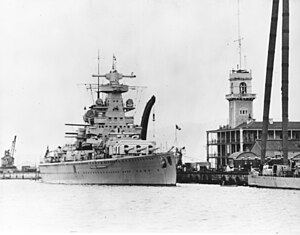Bombardment of Almería
| Bombardment of Almería | |||||||
|---|---|---|---|---|---|---|---|
| Part of the Spanish Civil War | |||||||
 Admiral Scheer in Gibraltar in 1936. |
|||||||
|
|||||||
| Belligerents | |||||||
|
|
|
||||||
| Strength | |||||||
| 1 pocket battleship 4 destroyers |
|||||||
| Casualties and losses | |||||||
| 19–20 civilians killed | None | ||||||
The Bombardment of Almería was a naval action which took place on 31 May 1937, during the Spanish Civil War. The Kriegsmarine bombed the city of Almeria in retaliation for a Republican air attack on the German cruiser Deutschland.
On April 1937, the Non-intervention Committee established naval patrols in order to patrol the Spanish coasts and harbors. The naval patrols were furnished by Great Britain, France, Germany and Italy. The Spanish Republican Air Force carried out attacks against the harbor of Mallorca, a known-Nationalist naval base. On 24 May 1937, a republican air raid hit the Italian cruiser Barletta, killing six Italian sailors and on the morning of 26 May another republican air raid nearly missed the German patrol ship Albatross. The commander of the German naval patrol protested, nevertheless Mallorca was a patrol zone assigned to France and the foreign ships were inside Spanish territorial waters. The same day, two republican bombers piloted by Russian pilots, attacked the German cruiser Deutschland at Ibiza, killing 20-23 German sailors and wounding 73. Hitler wanted to declare war on the Republic, but instead ordered to shell the city of Almeria.
At dawn 31 May 1937, the German pocket battleship Admiral Scheer and four German destroyers attacked the city of Almeria. The German ships fired 200 shells at the town, killing 19-20 civilians, wounding 50 and destroying 35 buildings.Indalecio Prieto, the Republican minister of Defense wanted to attack the German fleet, but the president Manuel Azaña and the prime minister Juan Negrin opposed to Prieto's plan because an open war against Germany might have brought the annihilation of the Republic. Negrin and Azaña sent protest notes to the secretary-general of the League of Nations and to the French and the English government. But the English and the French government said that the German attack had been justified.
...
Wikipedia
